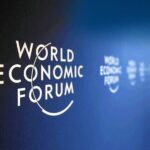 Thomas Hardy’s 1874 literary opus, Far from the Maddening Crowd, amongst other themes, captured the tranquility of his idyllic, utopian, Wessex countryside. The alluring panoramic settings of the cascading hills and valleys of Davos resort, sandwiched within the Swiss Graubünden canton, evokes a strikingly similar symbolism. Only this time, the Davos World Economic Forum summit (WEF) 2023 is just too real in a dystopian world!
Thomas Hardy’s 1874 literary opus, Far from the Maddening Crowd, amongst other themes, captured the tranquility of his idyllic, utopian, Wessex countryside. The alluring panoramic settings of the cascading hills and valleys of Davos resort, sandwiched within the Swiss Graubünden canton, evokes a strikingly similar symbolism. Only this time, the Davos World Economic Forum summit (WEF) 2023 is just too real in a dystopian world!
The convergence of pressing volatilities, critical uncertainties, policy complexities and strategic ambiguities around the world, presents huge, conflicting challenges in scope and scale, for the heads of government, global business titans, leaders of multilateral agencies, top financial institutions, activists and others, at this year’s WEF. Little wonder this year’s theme is aptly titled Cooperation in a Fragmented World. And you can bet the world needs that!
So, what innovative ideas and seminal policy initiatives have emerged out of previous summits and the recent, January 16-20, 2023 summit, as it pertains to; resolving the almost year-long pernicious Russian vs Ukrainian war of attrition? The global recession? Climate change? Digital inclusivity? The Fourth Industrial Revolution (4IR), artificial intelligence and the metaverse? Poverty alleviation? Open markets and heightened international trade? Curbing epidemics? Conflict resolution?
From its early foundations in 1971, as the European Management Forum, steered by its founder, Klaus Schwab, business strategy professor at the University of Geneva, it metamorphosed in 1987 to the World Economic Forum (WEF), with a strategic aim of affording a platform for the resolution of global conflicts and issues with remarkable successes. A case in point, was the Davos Declaration of 1988, which helped normalise relations between Greece and Turkey, after years of tensions, and played a significant role in in reversing what, at the time, seemed like an inexorable advance to war.
After decades of minority rule in apartheid South Africa, withering international economic sanctions, and intense global pressure for genuinely inclusive democratic reform, then president, F.W. de Klerk (1989-1994), had a first joint first meeting in 1992, in Davos, with the then leader of the African National Congress, Madiba Nelson Mandela, and Mangosuthu Buthelezi, founder of the Inkatha Freedom Party. The meeting was in the run up to the first multi-racial elections in South Africa, which witnessed the emergence of Nelson Mandela, as the first African to be elected President (1994-1999) in that country.
Again, Davos positively influenced, if only incrementally in diplomatic terms, the seemingly intractable Israeli vs Palestinian debacle over disputed territories. The 1994 WEF heralded the attendance of hitherto sworn enemies, Shimon Peres, former Israeli Foreign Secretary, later Prime Minister (1984-1986, 1995-1996) and Yasser Arafat, ex Palestinian leader (1969-2004), for seminal talks which, at the time, advanced the peace process between the two warring neighbours, paradoxically, of Abrahamic descent.
The need for inclusivity and, ostensibly, to deflect the perception of its Atlanticist and Eurocentric stance, informed the decision in 2007, to establish the annual summer meeting of the BRIC (Brazil, Russia, India, China) and developing economies’ in China. That said, Russia’s isolation by the United States, European and other allies, pursuant to the former’s invasion of Ukraine on February 24, 2022, tests the limits of the WEF’s avowed inclusivity in the quest for global peace and cooperation.
Another significant WEF accomplishment is the Coalition for Epidemic Preparedness Innovations (CEPI), conceived at the 2015 Davos summit. CEPI envisions the world, collaboratively and innovatively responding, through vaccine development, to the next virus, Z, within 100 days; thereby mitigating the catastrophic impacts of potential pandemics. CEPI’s initial USD460 million was made by a consortium including the Gates Foundation, Norway, Japan and India. This is a striking aspiration given average lead times for vaccine development is approximately 10 years! CEPI’s initial targets for vaccine development were six Epidemic Infectious Diseases (EIDs): i.) Ebola virus disease (EBV); ii.) Lassa fever; iii.) Marburg fever; iv.) MERS; v.) Nipah virus (NiV); and, vi.) Zika.
Putting this into sharper focus, between January 21 and 24, 2020, at the initial stages of COVID-19 for instance, CEPI leaders met with health chiefs to establish plans for a COVID-19 vaccine at Davos. At the time, the global confirmed cases were 274 including 16 deaths. Barely 3 years later, as of January 23, 2023, there have been 664,097,132 confirmed cases of COVID-19, including 6, 716,108 deaths; plus, a total of 13,131, 550, 798 vaccine doses administered as at 17 January 2023, according to the World Health Organisation.
Further, the WEF founder, Klaus Schwab, is credited with the conception of the Fourth Industrial Revolution or 41R. It explicates rapid and dynamic change traversing artificial intelligence, metaverse, smarter automation, industrialization, societal patterns, technology and hyper-connectivity throughout the 21st Century and beyond. More importantly, is the deployment to which emanations of the 4IR afford humanity within the province of advanced robotics, gene editing, financial intermediation, cancer treatment, medical science and even legal practice, amongst others; thereby blurring the demarcations between physical, biological and digital spaces.
Notwithstanding its phenomenal innovations, the WEF has been criticized on multiple fronts. One searing charge is that it has implicitly captured democratic institutions and decision making. The Transnational Institute (TNI), for example, asserts that all groupings like Davos, constitute “a silent coup d e’tat” to seize governance. In other words, Davos, supplants the democratic legitimacy of national parliaments. Is this necessarily true?
Another criticism is that it is prohibitively expensive for the average entrepreneur and corporate organisation. For instance, the rates for strategic partners in 2011 was USD 527, 000, whilst in 2014, it had risen to USD 628,000, an increase of 19.2 % in three years! However, is the WEF targeted at every entrepreneur or corporate organisation?
Questions have also been raised over the World Economic Forum’s tax status as a not-for-profit foundation and the completeness thereof, especially given heightened global attention on fiscal transparency.
Other criticisms include the high public cost of security, opaque decision making processes, and lack of transparency in determining who is invited and who isn’t, plus, the adverse environmental impacts of its annual meetings in Davos alone.
Summing up, of course, the World Economic Forum is not a “come one, come all affair” and was never envisaged to be such. By all objective assessments, it is a gathering of some of the world’s finest minds and top global organisations. Inherently, the intellectual value propositions offered by both segments reinforces the rationale for the segmentation of participation by world leaders, business titans and others.
On the issue of the WEF’s “capture” of democratic institutions, this contention reasonably upends logic. How can one not-for-profit institution “capture” democratic institutions? Afterall, neither one country nor organisation determines the global agenda and its priorities. Plus, no real or corporeal entity is compelled to attend Davos. Besides, its governing board has a broad-based international representation with brilliant minds, who have successfully led global businesses, multilateral agencies and or national institutions. Surely, these skillsets are brought to bear in the strategic aspirations of the WEF.
In policy terms, forward thinking initiatives straddling research and medical science, political rapprochement, open markets and free trade, have berthed at the WEF. To illustrate, WEF’s 2020 Nature Risk Report, estimated that approximately 50% of the world’s gross domestic product was highly or moderately dependent on nature. For example, cocoa, coffee, corn, cotton, wheat, gold, silver, crude oil, natural gas etc. The report established that USD1 spent on nature and environmental preservation was more likely than not to yield approximately USD 9 in profit. Irrespective of the profit incentive, the environmental protection implications are insuperable. And whilst there’s no direct correlation between the findings of the report and pan-European environmental policy it is nevertheless, worth noting that the European Union via Commission Decision (EU) 2022/2358 of December 1, 2022, pursuant to Article 20 of Regulation 1008/2008, in relation to France, acceded to time-bound restrictions on short-haul flights of less than 2.5 hours where viable alternatives exist.
Inescapably, no one institution or nation possesses a monopoly of knowledge in solving all the complex variables impacting humanity and global coexistence. It therefore stands to reason that collaboration between the private, public and not for profit sectors increases, rather than decreases, the capacity to address knotty global challenges. One recommendation is that this should be rightly encouraged whether under the auspices of the WEF or other regional or national groupings.
A second, is for the WEF to engage in closed door political negotiations on the Russian vs Ukrainian debacle. That’s because established institutions like the UN Security Council, European Union, African Union and others, have achieved marginal success in bringing the attritional war to an end. Besides, the WEF, has in the past, succeeded in weaving talks between previously warring parties with positive outcomes. The world should not look away glibly whilst the thousands of innocent lives are lost and pragmatic approaches justify serious considerations.
Third, the WEF should broaden the focus of the pioneering UpLink Innovation Challenge, a key outcome stemming from Davos 2023. Whilst the aspiration, is to brigade innovators, entrepreneurs, venture capitalists and other partners in addressing environmental and social entrepreneurship concerns, there is a case for extending this model to other regional hubs. The findings of the San Francisco pilot will, undoubtedly, afford some valuable insights in that regard.
Fourth, whilst CEPI is a laudable initiative, which has benefitted mankind, there is insufficient sensitisation of its role. This should be widened with view to attracting to impactful contributions from philanthropists and like-minded organisations.
Weaving this to the opening thread, although not Thomas Hardy’s idyllic Wessex, Davos, still maintains its primacy as a platform for framing innovative compacts, ideas and polices which help shape a better world for all.
Ojumu is the Principal Partner at Balliol Myers LP, a firm of legal consultants, in Lagos, Nigeria.












